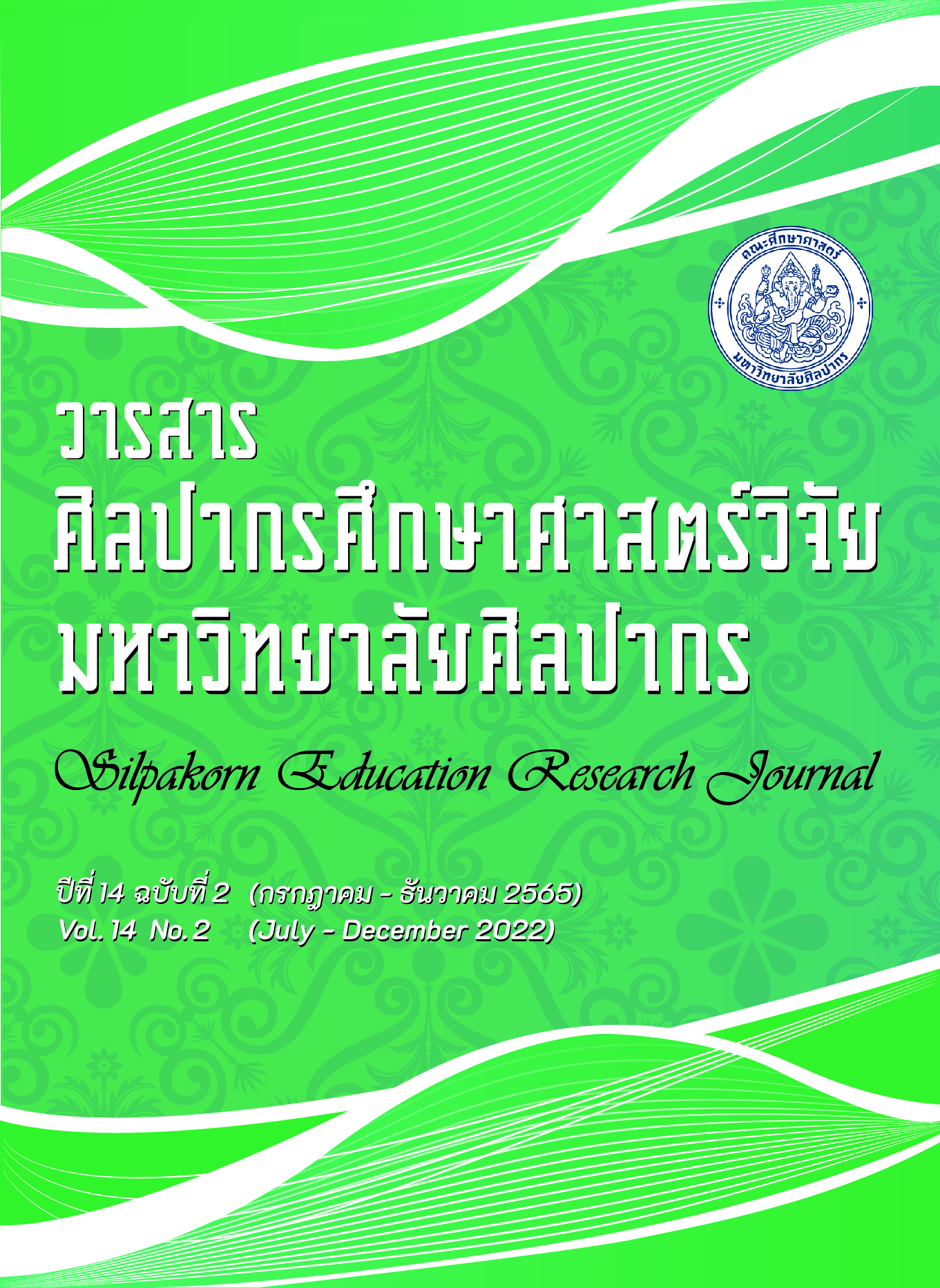การพัฒนากิจกรรมการเรียนรู้แบบออนไลน์โดยใช้ปรากฎการณ์เป็นฐานร่วมกับการสะท้อนคิด เพื่อเสริมสร้างการรู้ซึ้งถึงความรู้สึกในการกลั่นแกล้งกันบนโลกไซเบอร์ ของนักเรียนชั้นมัธยมศึกษาปีที่ 6
คำสำคัญ:
ปรากฎการณ์เป็นฐาน, การรู้ซึ้งถึงความรู้สึก, การกลั่นแกล้งกันบนโลกไซเบอร์บทคัดย่อ
การวิจัยในครั้งนี้มีจุดมุ่งหมายเพื่อ 1) สร้างและหาประสิทธิภาพของกิจกรรมการเรียนรู้แบบออนไลน์
โดยใช้ปรากฎการณ์เป็นฐานร่วมกับการสะท้อนคิด เพื่อเสริมสร้างการรู้ซึ้งถึงความรู้สึกในการกลั่นแกล้งกันบนโลกไซเบอร์ ของนักเรียนชั้นมัธยมศึกษาปีที่ 6 ตามเกณฑ์ 75/75 2) ทดลองใช้กิจกรรมการเรียนรู้แบบออนไลน์โดยใช้ปรากฎการณ์เป็นฐานร่วมกับการสะท้อนคิด เพื่อเสริมสร้างการรู้ซึ้งถึงความรู้สึกในการกลั่นแกล้งกันบนโลก
ไซเบอร์ ของนักเรียนชั้นมัธยมศึกษาปีที่ 6 โดยเปรียบเทียบการรู้ซึ้งถึงความรู้สึกในการกลั่นแกล้งกันบนโลกไซเบอร์ก่อนและหลังเรียนด้วยกิจกรรมการเรียนรู้ ดำเนินการศึกษาค้นคว้าตามกระบวนการวิจัยและพัฒนา มีกลุ่มตัวอย่างเป็นนักเรียนชั้นมัธยมศึกษาปีที่ 6 จำนวน 21 คน เครื่องมือที่ใช้ในการวิจัย ได้แก่ กิจกรรมการเรียนรู้แบบออนไลน์โดยใช้ปรากฎการณ์เป็นฐานร่วมกับการสะท้อนคิด แบบวัดการรู้ซึ้งถึงความรู้สึกในการกลั่นแกล้งกันบนโลกไซเบอร์ สถิติที่ใช้ในการวิเคราะห์ข้อมูล ได้แก่ ค่าร้อยละ ค่าเฉลี่ย ค่าส่วนเบี่ยงเบนมาตรฐาน และสถิติทดสอบค่าที ผลการวิจัยพบว่า 1. กิจกรรมการเรียนรู้แบบออนไลน์โดยใช้ปรากฎการณ์เป็นฐานร่วมกับการสะท้อนคิด
เพื่อเสริมสร้างการรู้ซึ้งถึงความรู้สึกในการกลั่นแกล้งกันบนโลกไซเบอร์ ของนักเรียนชั้นมัธยมศึกษาปีที่ 6
มีประสิทธิภาพเท่ากับ 74.44/75.41 2. นักเรียนชั้นมัธยมศึกษาปีที่ 6 ที่ได้รับการจัดกิจกรรมการเรียนรู้
แบบออนไลน์โดยใช้ปรากฎการณ์เป็นฐานร่วมกับการสะท้อนคิด มีการรู้ซึ้งถึงความรู้สึกในการกลั่นแกล้งกันบนโลกไซเบอร์ หลังเรียนสูงกว่าก่อนเรียน อย่างมีนัยสำคัญทางสถิติที่ระดับ .05
เอกสารอ้างอิง
Autthaporn, J. (2014). Development of an active online instructional model to enhance the learning behavior of undergraduate students. Journal of Education 9(4): 122-136. (in Thai)
Boonma, S. (2019). “The development of cognitively guided instruction learning and Socratic questioning techniques to enhance mathematical thinking on inequality for Mathayomsuksa 3 students”. Journal of Education 21(1): 77-91. (in Thai)
Brahmawong, C. (2013). “Developmental Testing of Media and Instructional Package”. Silpakorn Educational Research Journal 5(1): 1-20. (in Thai)
Brewer, G., and Kerslake, J. (2015). “Cyberbullying, self-esteem, empathy and loneliness”. Computers in Human Behavior 48(1): 255-260.
Buosonte, R. (2009). Research and Development in Education. Bangkok: Chulalongkorn University. (in Thai)
Butkatanyoo, O. (2018). “Phenomenon based Learning for Developing a Learner’s Holistic Views and Engaging in the Real World”. Journal of Education Studies 46(2): 348-365. (in Thai)
Chen, J. K. (2018). “Cyberbullying among secondary school students in Hong Kong”. The Hong Kong Journal of Social Work 52(1): 49-62.
Daehler, R. K. and Folsom J. (2016). Making Sense of SCIENCE: Phenomena-Based Learning. [Online]. Retrieved August 25, 2021, from http://www.WesrEd.org/mss.
Department of Children and Youth. (2020). Child and Youth Development Report 2020. [Online]. Retrieved May 16, 2022, from https://opendata.nesdc.go.th/dataset/situation-of-children-and-youth. (in Thai)
Dhamabusaya, M. (2007). The Socratic Questioning Technique. [Online]. Retrieved September 11, 2021, from http://lib.edu.chula.ac.th/IWEBTEMP/25650815/421320823615997.PDF.
Dulnakij, C. (2014). “Effects of using Doraemon manga with reflective thinking to create awareness of commitment to work of sixth grade students”. Journal of Education 9(1): 187-197. (in Thai)
Garaigordobil, M., and Valderrey, M. V. (2015). “Effects of Cyberprogram 2.0 on “face-to-face” bullying, cyberbullying, and empathy”. Psicothema 27(1): 45-51.
Klomkul, L. (2011). Effects of reflection process on the effectiveness of classroom action research: mixed methods research. Doctor of Philosophy Thesis Program in Educational Research Methodology Department of Educational Research and Psychology Faculty of Education Chulalongkorn University. (in Thai)
Maneenil, A. (2022). The Effect of Online Learning Activities Using Geographic Inquiry Process on Abilities of Analytical Thinking and Geographic Abilities of Secondary 1 Students. Academic MCU Buriram Journal 7(1): 101-114. (in Thai)
Pathanang, K. (2018). “Development of Learning Activities Using a Problem-Based Learning and Socratic Questioning Technique to Promote Critical Thinking in Mathayomsuksa 4 Students”. Journal of Humanities and Social Sciences Mahasarakham University 37(2): 57-67. (in Thai)
Rasoal, C., Jungert, T., and Hua, S. et al. (2011). “Ethnocultural versus Basic Empathy: Same or Different?”. Psychology 2(9): 925-930.
Sanintarajak, D. (2020). Development of learning activities using Korean drama to develop listening ability and speaking ability in Korean for grade 10 students. Master of Education Independent Study Program in Curriculum and Instruction Naresuan University. (in Thai)
Schwartz, H. M. (2017). An Exploratory Mixed-Methods Examination of Empathy and Multiple Intelligences Among Youth Involved in Bullying. Doctor of Philosophy Thesis Program in Psychological Studies in Education (School Psychology) The University of Nebraska.
Silander, P. (2015). Rubric for Phenomenon Based Learning. [Online]. Retrieved August 25, 2021, from http://www.phenomenaleducation.info/phenomenon-based-learning.html.
Singin, P. (2020). The development of learning activities by Phenomenon based learning to enhance health literacy for grade 9 students. Master of Education Independent Study Program in Curriculum and Instruction Naresuan University. (in Thai)
Smith,. K. P., Mahdavi, J. and Carvalho, M. et al. (2008). “Cyberbullying: its nature and impact in secondary school pupils”. The Journal of Child Psychology and Psychiatry 49(1): 376-385.
Sopa, K., Wintachai. J. (2017). “Effects of empathy development in mathayomsuksa 2 students”. An Online Journal of Education 12(1): 172-187. (in Thai)
Suler, J. (2005). “Contemporary media forum: The online disinhibition effect”. International Journal of Applied Psychoanalytic Studies 2(2): 184-188.
Thaworapot, S. (2020). A Development of dramatization learning activity for the improvement of Chinese language speaking and motivate the Chinese language learning for 10th grade students. Master of Education Independent Study Program in Curriculum and Instruction Naresuan University. (in Thai)
Topcu, C. (2008). The Relationship of Cyber bullying to empathy, gender, traditional bullying, Internet use and adult monitoring. Master of Science Thesis Program in Education Science Middle East Technical University.
Tubtawee, C. (2015). “Enhancing Empathy Through Person-Centered Group Counseling of Staff in A Rehabilitation Center”. Journal of Education 26(2): 130-144. (in Thai)
Udris, R. (2015). “Cyberbullying in Japan: An exploratory study”. International Journal of Cyber Society and Education 8(2): 59-80.
Viriya, P. (2021). The Efficiency Study of Instructional Activities on World Current Events For Senior High School Students. Journal of education silpakorn university 19(2): 400-414. (in Thai)
Zelidman, A. (2014). Empathy As A Moderator Of Adolescent Bullying Behavior And Moral Disengagement After Controlling For Social Desirability. Doctor of Philosophy Thesis Program in Education Psychology Wayne State University.





